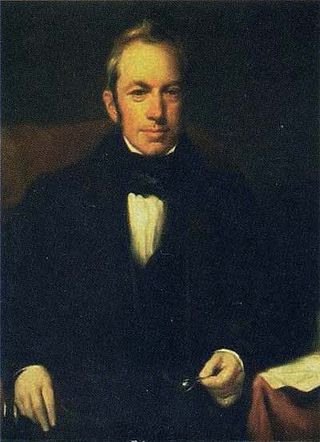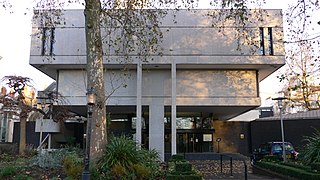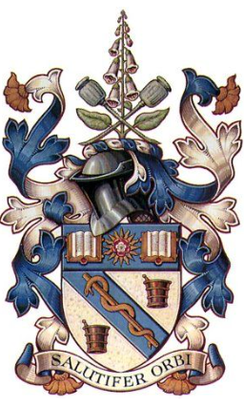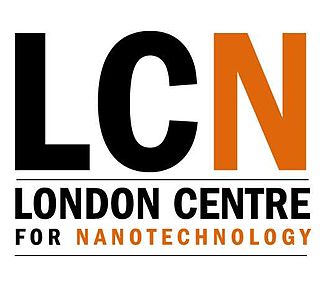
The University of Manchester is a public research university in Manchester, England. The main campus is south of Manchester City Centre on Oxford Road. The university owns and operates major cultural assets such as the Manchester Museum, The Whitworth art gallery, the John Rylands Library, the Tabley House Collection and the Jodrell Bank Observatory – a UNESCO World Heritage Site. The University of Manchester is considered a red brick university, a product of the civic university movement of the late 19th century. The current University of Manchester was formed in 2004 following the merger of the University of Manchester Institute of Science and Technology (UMIST) and the Victoria University of Manchester. This followed a century of the two institutions working closely with one another.

GKT School of Medical Education is the medical school of King's College London. The school has campuses at three institutions, Guy's Hospital (Southwark), King's College Hospital and St Thomas' Hospital (Lambeth) in London – with the initial of each hospital making up the acronymous name of the school. The school in its current guise was formed following a merger with the United Medical and Dental Schools of Guy's and St Thomas' Hospitals on 1 August 1998. As of 2023, the medical school is ranked 5th best in the UK for clinical medicine by U.S. News & World Report, and 10th best worldwide by Times Higher Education.

King's College London is a public research university located in London, England. King's was established by royal charter in 1829 under the patronage of King George IV and the Duke of Wellington. In 1836, King's became one of the two founding colleges of the University of London. It is one of the oldest university-level institutions in England. In the late 20th century, King's grew through a series of mergers, including with Queen Elizabeth College and Chelsea College of Science and Technology, the Institute of Psychiatry, the United Medical and Dental Schools of Guy's and St Thomas' Hospitals and the Florence Nightingale School of Nursing and Midwifery.

Robert Brown was a Scottish botanist and paleobotanist who made important contributions to botany largely through his pioneering use of the microscope. His contributions include one of the earliest detailed descriptions of the cell nucleus and cytoplasmic streaming; the observation of Brownian motion; early work on plant pollination and fertilisation, including being the first to recognise the fundamental difference between gymnosperms and angiosperms; and some of the earliest studies in palynology. He also made numerous contributions to plant taxonomy, notably erecting a number of plant families that are still accepted today; and numerous Australian plant genera and species, the fruit of his exploration of that continent with Matthew Flinders.

The Royal College of Physicians of London, commonly referred to simply as the Royal College of Physicians (RCP), is a British professional membership body dedicated to improving the practice of medicine, chiefly through the accreditation of physicians by examination. Founded by royal charter from King Henry VIII in 1518, as the College of Physicians, the RCP is the oldest medical college in England.

The UCL School of Pharmacy is the pharmacy school of University College London (UCL). The School forms part of UCL's Faculty of Life Sciences and is located in London, United Kingdom.

Biochemical engineering, also known as bioprocess engineering, is a field of study with roots stemming from chemical engineering and biological engineering. It mainly deals with the design, construction, and advancement of unit processes that involve biological organisms or organic molecules and has various applications in areas of interest such as biofuels, food, pharmaceuticals, biotechnology, and water treatment processes. The role of a biochemical engineer is to take findings developed by biologists and chemists in a laboratory and translate that to a large-scale manufacturing process.

Micrographia: or Some Physiological Descriptions of Minute Bodies Made by Magnifying Glasses. With Observations and Inquiries Thereupon is a historically significant book by Robert Hooke about his observations through various lenses. It was the first book to include illustrations of insects and plants as seen through microscopes.

Semmelweis University is a research-led medical school in Budapest, Hungary, founded in 1769. With six faculties and a doctoral school it covers all aspects of medical and health sciences.
Naresuan University is a public university in Phitsanulok Province, northern Thailand. It was established as a separate university on 29 July 1990, the 400th anniversary of the start of the reign of Phitsanulok-born King Naresuan the Great. A courtyard with a statue of King Naresuan is on the campus grounds and students regularly pay their respects before it. The university has about 20,000 full-time students.

The Institute of Psychiatry, Psychology & Neuroscience (IoPPN) is a centre for mental health and neuroscience research, education and training in Europe. It is dedicated to understanding, preventing and treating mental illness, neurological conditions, and other conditions that affect the brain. The IoPPN is a faculty of King's College London, England, and was previously known as the Institute of Psychiatry (IoP).
The Faculty of Science at the University of Melbourne is one of the largest in Australia, with over 10,000 undergraduate and postgraduate students and a significant interdisciplinary research agenda.

The London Centre for Nanotechnology is a multidisciplinary research centre in physical and biomedical nanotechnology in London, United Kingdom. It brings together three institutions that are referents in nanotechnology, University College London, Imperial College London and King's College London. It was conceived from the outset with a management structure allowing for a clear focus on exploitation and commercialisation. Although based at UCL's campus in Bloomsbury, the LCN includes research in departments of Imperial's South Kensington campus and in King's Strand campus.

The University of Kentucky College of Pharmacy is a college of pharmacy located in Lexington, Kentucky. In 2020, U.S. News & World Report recognized the UK College of Pharmacy as one of the nation's top ten pharmacy programs.
The College of Biological Sciences (CBS) is one of seven freshman-admitting colleges at the University of Minnesota. Established in 1965, the College of Biological Sciences is located on both the Minneapolis and the St. Paul campuses. Faculty in the college conduct research on a wide range of topics that contribute to understanding of the environment, human health and basic biology. Dr. Saara J. DeWalt is the current dean of the college.

King Abdullah University of Science and Technology is a Private university research university located in Thuwal, Saudi Arabia. Founded in 2009, the university provides research and graduate training programs in English as the official language of instruction. It is named after King Abdullah bin Abdulalziz, the ruler of Saudi Arabia from 2005 until 2015.
The UCL Faculty of Life Sciences is one of the 11 constituent faculties of University College London (UCL).
The UCL Faculty of Mathematical and Physical Sciences is one of the 11 constituent faculties of University College London (UCL). The Faculty, the UCL Faculty of Engineering Sciences and the UCL Faculty of the Built Envirornment together form the UCL School of the Built Environment, Engineering and Mathematical and Physical Sciences.














